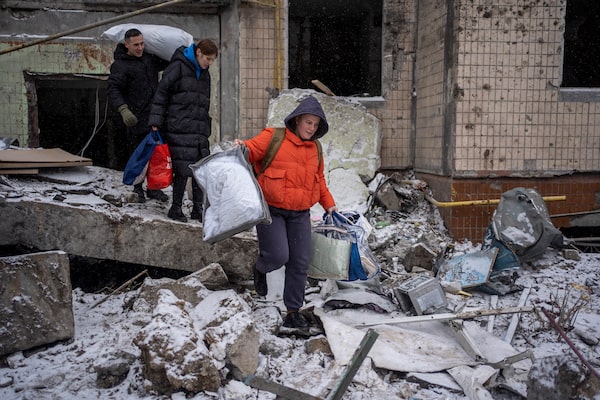A heavily damaged church in the village of Bohorodychne, in Ukraine’s Donetsk region, on Nov. 20, 2023.EMILE DUCKE/The New York Times News Service
Vladyslav Golovin is a Ukrainian journalist and former deputy editor-in-chief for Forbes Ukraine.
Recent coverage of the Russia-Ukraine war seems to have generated some small hope for peace. “Putin Quietly Signals He Is Open to a Ceasefire in Ukraine,” read one recent New York Times headline. “The United States should begin consultations with Ukraine and its European partners on a strategy centered on Ukraine’s readiness to negotiate a ceasefire with Russia,” two columnists wrote in Foreign Affairs in October.
Such sentiments grew louder and more frequent in December, emanating from sources associated with various government authorities, former diplomats and some politicians. The prevailing message is unmistakable: A collective weariness with the bloody and exhausting war has led to a push for Ukraine to embark on a path to negotiation, to put an end to the violence.
As a Ukrainian citizen, my yearning for peace goes beyond what any politician can fathom. Since March, 2022, my family has lived as refugees in Germany while I have remained in Ukraine, and my only connection with my daughters and son is through the cold glow of a WhatsApp call. I ache at the missed chances to witness their growth firsthand. But this personal pain pales in comparison to the anguish of millions of Ukrainians who have lost loved ones and endured unimaginable hardships. Children have lost their fathers; mothers have been raped in occupied territories. We have lost so much that it can hardly be described in words. The desire for peace among Ukrainians is stronger than any commentator could imagine.
So how do we reach this peace? What can we do to reunite families, and save the lives of our people? The most common answer in every civilized society is to start negotiations. You are in conflict, so do your best to find a compromise. This sounds pretty logical and understandable.
The problem is that we have already tried this approach with Russia, several times – and it appeared to be not only useless, but even more dangerous. After the collapse of the Soviet Union, Russia and Ukraine signed and ratified many different agreements regarding “friendship and co-operation” between our two countries. In January, 2003, our presidents signed an agreement about the mutual recognition of the borders of Russia and Ukraine. This document was ratified by the parliaments of both countries in the same year. We even signed a ceasefire with Russia in February, 2015, known as the Minsk II Agreement; Russia broke it countless times. All of these agreements led to invasion, to missiles, to the destruction of our houses, to bullets, and the killing of our soldiers. It’s sad, but true: “Russians never forgive any of your will to establish friendship with them,” prominent Tatarian journalist Ayder Muzhdabayev once noted.
Yes, we know that a ceasefire would give us the opportunity to heal our wounds, to produce more weapons and make our army stronger. But that is what our enemies will also do.
The negotiation approach simply does not work because Ukrainians are not in a temporary conflict. This is an existential war for our country’s survival.
The repeated failure of negotiation attempts lays bare a harsh truth – the pursuit of peace presents itself as a sign of weakness to Russia. Operating like a “mafia state,” Russia only responds to the language of power. The negotiation approach, while offering a brief respite, fails to address the core issue: Vladimir Putin’s refusal to recognize Ukraine as a sovereign state. To him, we are mere “spoiled Russians” in need of re-education, according to Russian propaganda. That is why they are taking our children from occupied territories and immediately starting to teach them to love Russia.
And any negotiations will become nothing more than a fleeting pause before a renewed, more devastating Russian onslaught. Mr. Putin’s disregard for Ukraine’s sovereignty demands a radical shift in approach. The only conceivable path to peace lies in weakening the Russian army, and forcing the Kremlin to seek terms favourable to Kyiv. Despite the Ukrainian army acknowledging Russia’s numerical and logistical advantages, it stands strong, resilient and intelligent.
Despite setbacks in the summer counteroffensive, the Ukrainian army successfully reclaimed the Kyiv and Kharkiv regions, while thwarting Russian advances in Kherson. Peace can only be pursued by Ukraine if it is backed by a formidable military effort, to ensure negotiations don’t become a ruse for renewed aggression. Weakness, as history has shown, only invites further deception from Russia, and tragedy for the Ukrainian people.
A peace forged on the anvil of a robust military operation is what will lead to a lasting, meaningful resolution of this conflict.
In short, words cannot stop Russia. Only heavy weapons will.

A woman carries belongings rescued from an apartment that was destroyed by a Russian attack on Jan. 2 in Kyiv, Ukraine, on Jan. 3, 2024.Hanna Arhirova/The Associated Press